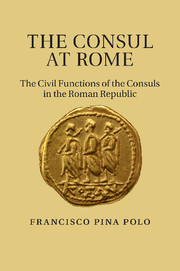Book contents
- Frontmatter
- Contents
- List of illustrations
- Acknowledgements
- Introduction
- PART I THE CONSULAR FUNCTIONS IN THE PRE-SULLAN AGE (367–81)
- 1 The consuls taking office
- 2 Consuls and civic religion
- 3 Consuls, the agents of diplomacy in the Roman state
- 4 Communication between the consuls and the people: edicts and contiones
- 5 Consuls as legislators
- 6 The jurisdiction of the consuls
- 7 Consuls as promoters of public works
- 8 Colonization and distribution of land
- 9 Appointment of a dictator
- 10 Consuls presiding over elections
- 11 The consular year in the pre-Sullan age
- PART II THE CONSULAR FUNCTIONS IN THE POST-SULLAN AGE (80–50)
- 15 Conclusion
- Bibliography
- Index of Subjects
- Index of Ancient Sources
- Index of Ancient Personal Names
5 - Consuls as legislators
Published online by Cambridge University Press: 25 October 2011
- Frontmatter
- Contents
- List of illustrations
- Acknowledgements
- Introduction
- PART I THE CONSULAR FUNCTIONS IN THE PRE-SULLAN AGE (367–81)
- 1 The consuls taking office
- 2 Consuls and civic religion
- 3 Consuls, the agents of diplomacy in the Roman state
- 4 Communication between the consuls and the people: edicts and contiones
- 5 Consuls as legislators
- 6 The jurisdiction of the consuls
- 7 Consuls as promoters of public works
- 8 Colonization and distribution of land
- 9 Appointment of a dictator
- 10 Consuls presiding over elections
- 11 The consular year in the pre-Sullan age
- PART II THE CONSULAR FUNCTIONS IN THE POST-SULLAN AGE (80–50)
- 15 Conclusion
- Bibliography
- Index of Subjects
- Index of Ancient Sources
- Index of Ancient Personal Names
Summary
It is indisputable that the higher magistrates, the consuls amongst them, had the capacity of legislative initiative. In fact, this is one of the functions that Polybius attributes to consuls: to present proposals before the popular assembly while in Rome before setting off for their provinces, a function which is unanimously accepted by all those who have worked on the lawmaking process of the Roman Republic.
An episode that occurred in 210 illustrates this fact. When the moment to hold consular elections arrived, the senate summoned the consul M. Valerius Laevinus to Rome by means of a letter written by the urban praetor. Valerius informed the senate of the latest events in Sicily. Not long before his arrival, the ambassadors of King Syphax had reported on the situation in Africa to the senators, who were alarmed by the news and considered it necessary for the consul to return immediately to his province without waiting for the elections over which he was to preside. The senate requested that before leaving the consul appoint a dictator to be in charge of the elections, a request which brought about a dispute between the consul and the senators. Valerius claimed that he wished to appoint as dictator M. Valerius Messalla, who was the head of the fleet at the time, and that he would make this appointment upon his arrival in Sicily. The senators opposed this, declaring that nobody who was outside of the ager Romanus could legally be appointed as dictator.
- Type
- Chapter
- Information
- The Consul at RomeThe Civil Functions of the Consuls in the Roman Republic, pp. 99 - 121Publisher: Cambridge University PressPrint publication year: 2011



